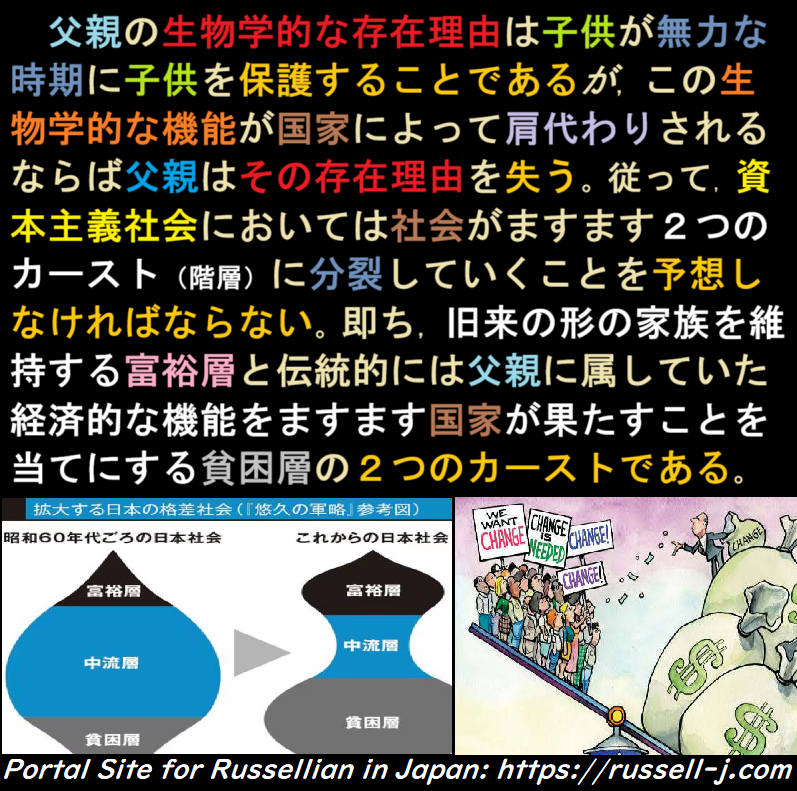
 ラッセル関係電子書籍一覧 |
父親の生物学的な存在理由は子供が無力な時期にその子供を保護することであるが,この生物学的な機能が国家によって肩代わりされるならば,父親はその存在理由を失う。従って,資本主義社会においては社会がますます2つのカースト(階層)に分裂していくことを予想しなければならない。即ち,旧来の形の家族を維持する富裕層と伝統的には父親に属していた経済的な機能をますます国家が果たすことを当てにする貧困層の2つのカーストである。
The biological purpose of the father is to protect children during their years of helplessness, and when this biological function is taken over by the State, the father loses his raison d'etre. We must, therefore, in capitalistic communities expect an increasing division of society into two castes, the rich preserving the family in its old form, and the poor looking more and more to the State to perform the economic functions traditionally belonging to the father.
Source: Bertrand Russell: Marriage and Morals, 1929
More info.:https://russell-j.com/beginner/MM15-030.HTM
<寸言>
高度成長期の日本は経済格差がそれほど大きくなく、分厚い中間層があったためか、富裕層、中間層、貧困層の3つの層にわけて考えることがけっこうありました。その後、中間層が薄くなり、5つの階層(たとえば、超富裕層、富裕層、準富裕層、アッパーマス層、マス層=貧困層)にわけて考えることが多くなりました。もちろん、社会は複雑であり、5階層以上に細分化して考えたほうがよい場合もあるでしょうが、おおざっぱに見たほうがよい場合もあります。特に、近年においては、資本主義の先進国においては世界的に経済格差が進み、富裕層と貧困層との差が目立つようになってきています。そうして、富裕層の人達は認めようとしない人もいますが、社会の分断化が進んできています。
経済格差は教育格差や貧富の格差につながり、貧困家庭あるいは貧困でなくても余裕のない生活をしている家庭は国家や社会の支援を当てにするようになり、国家による支配をより受けることになっていきます。こういった傾向について問題意識を持つ人も多いですが、ほとんど問題意識をもたない人も多くいます。あなたはどちらでしょうか?
During Japan’s period of rapid economic growth, income inequality was relatively small, and the presence of a large and stable middle class led to a common practice of viewing society in terms of three layers: the wealthy, the middle class, and the poor. Later, as the middle class thinned out, people increasingly began to view society in terms of five classes, such as the ultra-wealthy, the wealthy, the semi-wealthy, the upper mass class, and the mass class (i.e., the poor). Of course, society is complex, and in some cases it may be more appropriate to divide it into more than five layers. However, in other cases, a broader, more general classification may be more useful.
In recent years especially, economic disparities have become more pronounced in advanced capitalist nations around the world, and the gap between the rich and the poor has become increasingly visible. As a result, although some among the wealthy refuse to acknowledge it, social fragmentation has become more evident.
Economic inequality leads to educational inequality and widening gaps in wealth and opportunity. Families living in poverty, or even those not strictly poor but leading economically strained lives, have come to rely more on the support of the state and society, thereby placing themselves under greater control by the state. While many people are aware of and concerned about this trend, there are also many who have little to no awareness of the problem. Which side do you fall on?